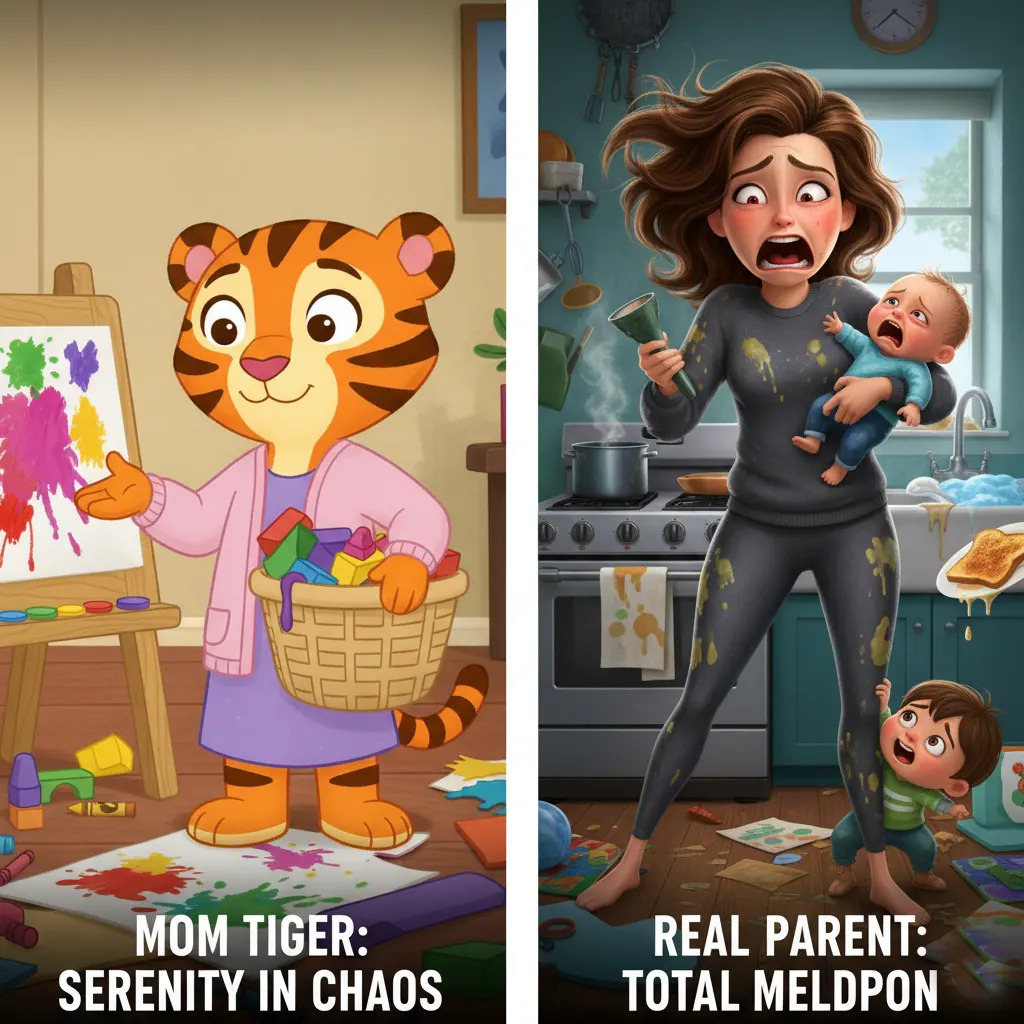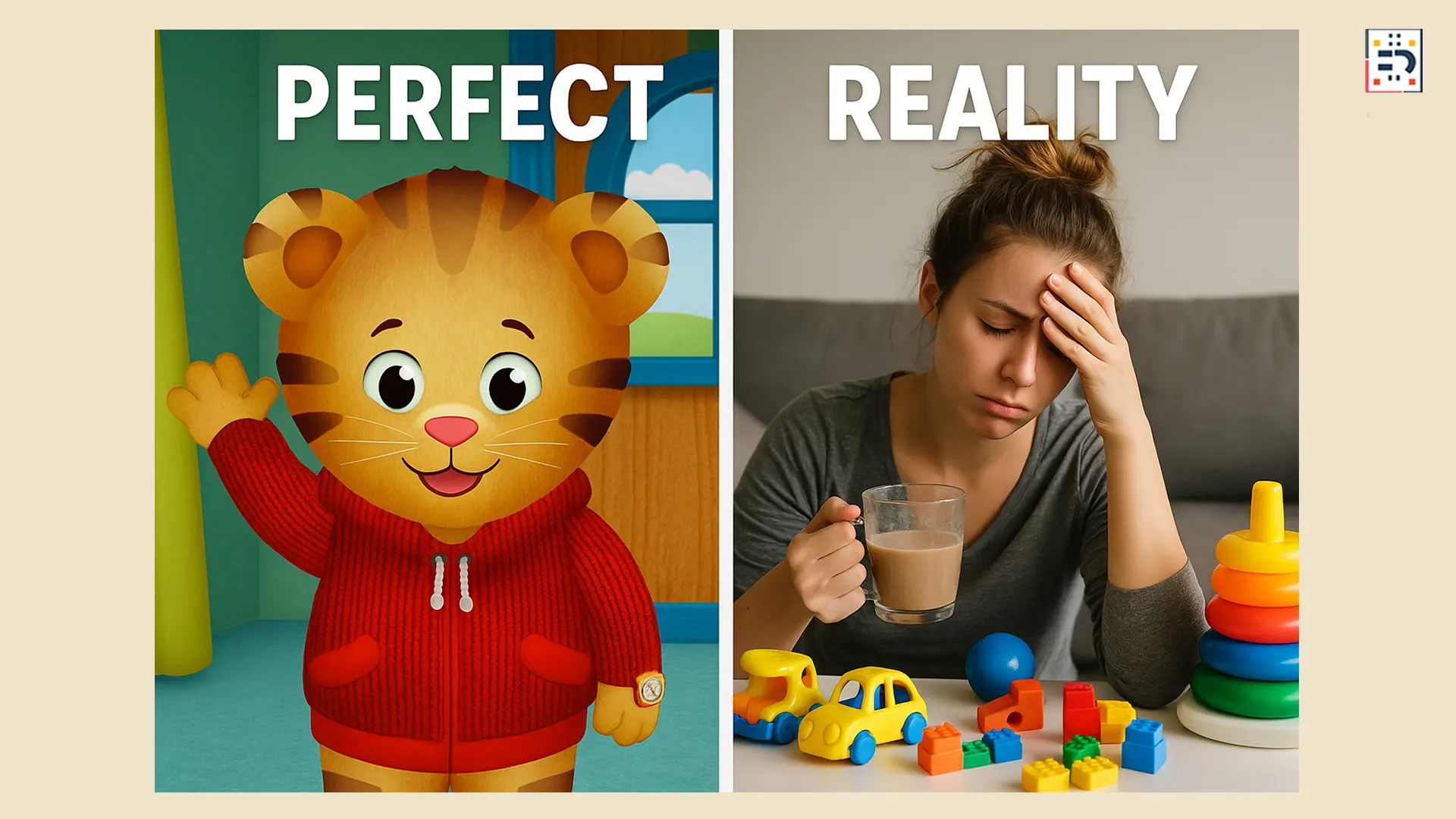We’ve all been there. The toys are scattered like landmines across the living room, you’re running on three hours of broken sleep, and the only thing standing between you and a full-blown meltdown (yours, not your toddler’s) is 25 minutes of quiet.
You press play. A gentle voice sings, “It’s a beautiful day in the neighborhood…” You breathe a sigh of relief. Daniel Tiger to the rescue.
But as the episodes wear on, a quiet, heretical thought begins to form in the back of your mind, one you’d only dare whisper to your most trusted parent-friend: “Is it just me, or is Daniel Tiger… annoying?”
You are not alone. In parenting forums and playground whispers, a rebellion is brewing. We’re finally admitting that the “perfect” kids’ TV show might be perfect for our children, but it’s a unique form of psychological endurance test for us.
The Gospel of Grr-ific Feelings
Let’s be clear: We get it. The show is a masterpiece of child psychology. The lessons are pure gold: “When you feel so mad that you want to roar, take a deep breath and count to four.” These jingles are magic spells for toddler behavior, and the approach is lauded by experts in early childhood education for teaching core social-emotional skills. For that, we are genuinely grateful.
But for parents, the very things that make it effective for tiny brains are what make it excruciating for our adult ones.

The Case Against the Striped Sweater
So, what exactly is the source of this low-grade parental irritation?
- The Relentless Repetition: We know repetition is key for learning. But hearing “Grown-ups come back” for the 500th time while you’re just trying to take out the trash can feel less like a comforting promise and more like a cognitive water torture. The songs are brilliant earworms, a phenomenon studied by music psychologists for their ability to burrow deep into our memory on an endless, saccharine loop.
- The Unbearable Slowness of It All: The Land of Make-Believe operates at a glacial pace. The gentle, deliberate cadence of the dialogue, the long pauses, the slow-blinking animations… It’s a world designed for a toddler’s processing speed, which is the exact opposite of a parent’s overstimulated, caffeine-fueled reality. This deliberate pacing, while educationally sound, stands in stark contrast to the rapid-fire editing that defines most adult entertainment.
- The Pressure of Perfection: Daniel’s world is so… understanding. Mom Tiger has the patience of a saint, a standard that can feel unattainable. The conflicts are always neatly resolved with a jingle and a hug. It sets an impossibly high bar for parental conduct, making our own messy, real-world parenting feel inadequate by comparison. This constant exposure to idealized family dynamics can subtly contribute to the parental burnout that is widely recognized by family therapists.
- Daniel’s Passive Aggression: Let’s be real. Sometimes, Daniel’s wide-eyed, whispery “Okay…” when he doesn’t get his way feels less like acceptance and more like the most polite guilt trip ever deployed. It’s a masterclass in making you feel bad for asking him to share.
Breaking the Illusion: It’s a Sign of Health
Acknowledging this annoyance isn’t about hating a kind-hearted tiger. It’s a sign that we, as parents, are breaking free from the illusion that any single piece of media can be a perfect, painless solution. It’s a recognition of our own humanity and our own sensory limits. This kind of honest conversation is a healthy step, much like the growing discourse around creating balanced screen time habits for families.
Our kids see a friend learning about feelings. We see a utopian society where the biggest problem is a missing rubber ducky, narrated by a character whose unwavering patience is, frankly, superhuman.

The Verdict: A Necessary Annoyance?
So, where does this leave us? Do we banish Daniel and the gang to the Island of Lost Misfit Toys?
Probably not. And that’s the real confession.
We’ll likely keep pressing play. Because while Daniel Tiger might be the annoying, slow-talking, endlessly repetitive neighbor we never asked for, he’s also the one who taught our child to use their words. The show’s foundation, based on the timeless work of Fred Rogers, provides a genuine core of kindness and empathy that is undeniably valuable.
The truth is, the best kids’ shows aren’t always a joy for adults—they are a tool. And sometimes, the most useful tools are a little grating. So the next time you hear that familiar trolley bell, know that you’re not a bad parent for cringing. You’re just a tired, real one. And that’s perfectly grr-ific
#DanielTiger #ParentingTruth #MomLife #DadLife #ToddlerLife #KidsTV #ScreenTime #ParentingHacks #ItsOkayToNotBeOkay #MomConfessions


